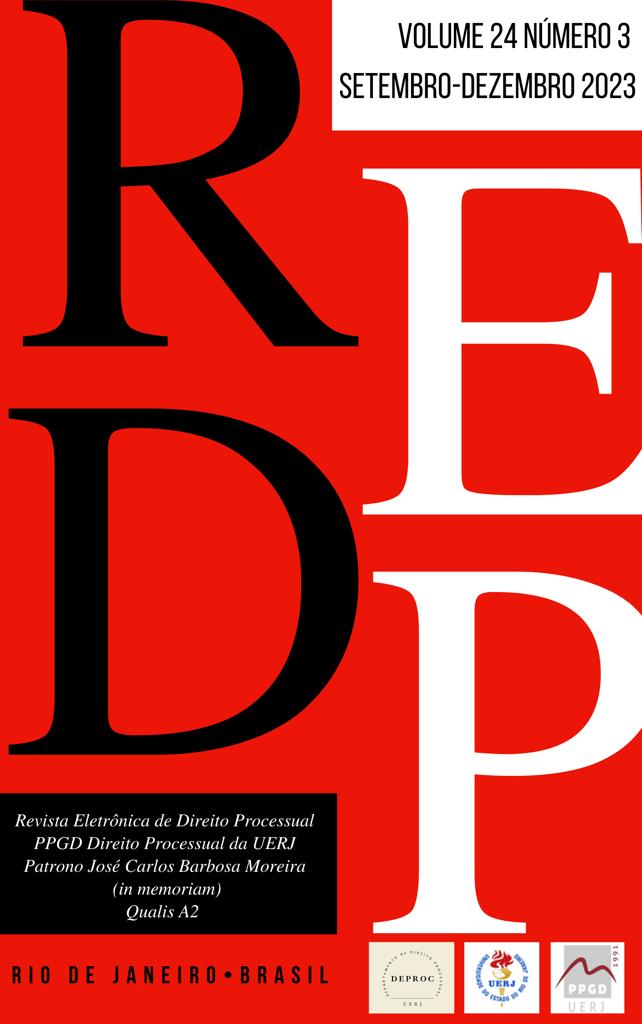ITALY 2023, RIFORMA CARTABIA INNOVATIONS IN THE CIVIL PROCESS AND ADR; POTENTIAL INTERAC-TIONS?
DOI:
https://doi.org/10.12957/redp.2023.79573Resumo
Civil cases pending in Italian civil courts at the end of 2019 no. 5,826,440. Delegated Law 69/2009 and Legislative Decree 28/2010 ruled mandatory civil commercial mediation in the contemporary Italian legal system. Strong opposition from lawyers and benign neglect from the judiciary. Main objection: “Mediation does not belong to the Italian legal culture”: History teaches the opposite! 2012, the intervention of the Constitutional Court, excess of delegation; back to voluntary mediation. Law decree 69/2013, called “Del fare”, ruled the OPT-OUT mandatory mediation procedure, the compulsory lawyer’s assistance and declared lawyers mediators “ope legis”! 2017, Alpa Commission (“A world of experience has opened up, that … until now had not been perceived in all its extent and complexity”); the final report remained in a drawer. Delegated Law 206/2011, Luiso Commission (“The process will be civil”), Legislative Decree 149/2022, Riforma Cartabia: major innovations in the code of civil procedure and ADR. The new cognitive process under ordinary procedure is based on the anticipation of the first hearing: documents by the parties already laid out, so that the judge, after the free and non-formal questioning of the parties, can proceed to assess the admissibility and relevance of the means of proof and set the trial-calendar. June 30, 2023, mediation 4.0 takes off: increase of compulsory subjects; enhancement of the court-mandated mediation, involvement of the public administration, regulation of the report of the technical consultant in mediation, ODR, opposition to injunctions, tax incentives and fines to achieve the effectiveness of the procedure. As of October 10, 2023, the standards for fees of procedures and quality of training are still pending. Will the requirements for the parties' lawyers to prepare all the necessary documentation immediately before the first hearing (and the associated expensive fees for their clients) induce the parties to consider going to mediation more in order to avoid litigation (and its costs)?
Downloads
Publicado
Versões
- 2023-10-16 (2)
- 2023-10-16 (1)
Como Citar
Edição
Seção
Licença
Copyright (c) 2023 Giovanni Matteucci

Este trabalho está licenciado sob uma licença Creative Commons Attribution 4.0 International License.
Todos os artigos publicados na Revista Eletrônica de Direito Processual (REDP) (Departamento de Direito Processual, Universidade do Estado do Rio de Janeiro, Brasil) são licenciados por meio de uma Licença Creative Commons - Atribuição 4.0 Internacional (CC BY 4.0).
Os autores retêm os direitos autorais de seu artigo e concordam em licenciar seu trabalho com a licença CC BY 4.0, aceitando assim os termos e condições específicos desta licença disponíveis no seguinte website: https://creativecommons.org/licenses/by/4.0/legalcode.
- Os autores concedem à REDP o direito de primeira publicação, de se identificar como publicadora original do trabalho e concedem à revista uma licença de direitos não exclusivos para utilizar o trabalho das seguintes formas: Reproduzir, vender e distribuir cópias eletrônicas ou impressas do manuscrito como um todo, de partes específicas do manuscrito e de suas traduções para qualquer idioma;
- O uso do artigo por terceiros é livre, contanto que a integridade da publicação seja mantida e seus autores originais, periódico de primeira publicação e detalhes de citação sejam identificados.
Dentro dos termos da licença, os autores podem entrar em acordos contratuais adicionais separados para a distribuição não exclusiva da versão publicada do trabalho na revista.
Copyright and Licensing
All articles published in the Procedural Law Electronic Review (REDP) (Department of Procedural Law, State University of Rio de Janeiro, Brazil) are licensed under a Creative Commons License - Attribution 4.0 International (CC BY 4.0).
- Authors retain copyright to their article and agree to license their work under the CC BY 4.0 license, thereby accepting the specific terms and conditions of this license available at the following website: https://creativecommons.org/licenses/by/4.0/ legal code.
- Authors grant REDP the right of first publication, to identify itself as the original publisher of the work, and grant the journal a non-exclusive license to use the work in the following ways: Reproduce, sell and distribute electronic or printed copies of the manuscript as a whole, of specific parts of the manuscript and its translations into any language;
- Use of the article by third parties is free, as long as the integrity of the publication is maintained and its original authors, first publication journal, and citation details are identified.
Within the terms of the license, authors may enter into separate additional contractual agreements for the non-exclusive distribution of the published version of the work in the journal.




